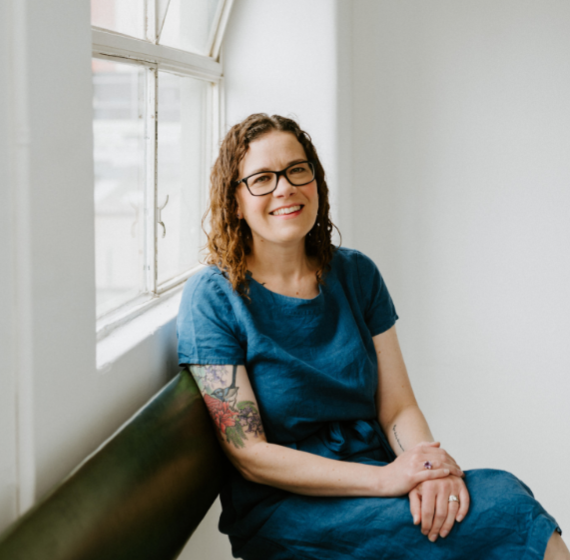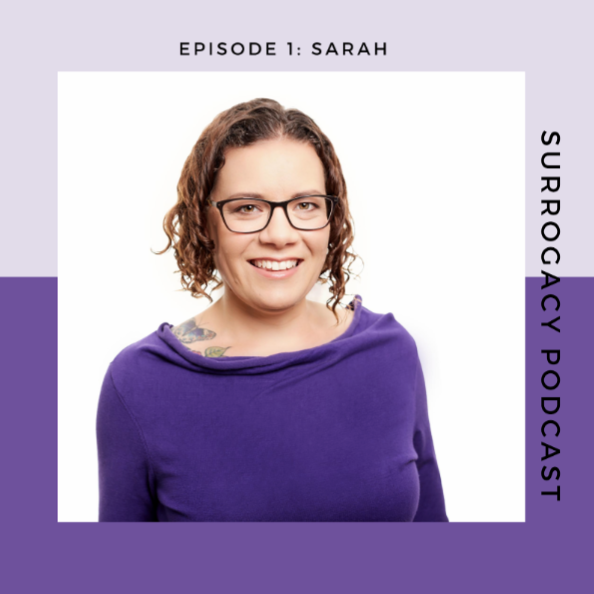On Love & Law – A Journey from Surrogate to Surrogacy Lawyer
Author: Tiffany Lu
Interviewers: Listy Le, Dylan Dinh & Tiffany Lu
Sarah Jefford is an accomplished family creation lawyer, author, and former surrogate. Following her own surrogacy experience in 2018, her personal journey into surrogacy has blossomed into a mission to raise awareness, improve access to information, and help surrogates and intended parents navigate their journey with confidence.
Chapter 1: Unexpected Beginnings
Sarah’s legal journey has not been a linear one. After completing her practical legal training, Sarah began her career at Victorian Legal Aid, first as a Grants Officer and then as a Family Lawyer, working primarily in family violence. For eight years, she navigated the ‘intense’ environment before her office in Preston closed and she was made redundant. ‘I was at home with a baby and a toddler, so I didn’t have a job for about fifteen months.’ A pause that gave her time to contemplate her next career move.
Soon after, Sarah joined the Aboriginal Legal Service as a Legal Practice Manager and Family Lawyer, but her interests were shifting. Having undergone IVF for her first son, Sarah began exploring the possibility of supporting others with their fertility treatment, leading her to egg donation. However, with her family complete, she found herself drawn to the idea of being pregnant again. ‘I really liked the idea of being pregnant again,’ she admits with a smile, ‘which might sound a bit weird, but lots of women say, “Yeah, I enjoyed pregnancy”.’ This feeling planted the seed that began her career in Surrogacy Law. While researching egg donation, Sarah came across stories from women who had been surrogates. ‘I thought, “I could do that. I could carry a baby and be a surrogate for somebody”.’
In 2018, she carried a baby for a gay couple in Melbourne. Her personal experience as a surrogate opened doors into a tight-knit community of surrogates and intended parents, where stories were shared freely. But it quickly revealed the glaring gap in public understanding on the topic. ‘My experience as a surrogate was unique to other people, but not unique in the surrogacy community.’
Chapter 2: Finding New Ground
Sarah’s turning point came when she attended a surrogacy conference aimed at guiding intended parents through the process. Almost immediately, she noticed the barriers to information. ‘There were very few lawyers who knew what they were doing,’ she recalls. ‘It was very male-dominated and there were no voices of women who had been surrogates.’
The experience reminded her of her time at Legal Aid, where resources were scarce and clients often could not afford private legal representation. There, she learned the value of community legal education: providing free, accessible information to support people in making empowered decisions about their next legal steps. Sarah knew that the surrogacy space desperately needed this approach. ‘When people Google surrogacy, there's not a lot of information out there, and that's not legal advice that you need to charge for. It's just information about what the process is, or whether you qualify to do surrogacy.’
Reflecting on Australians’ understanding of surrogacy, Sarah admits, ‘We need to do better. We can actually educate the community a bit better about how it works, and the best way to do surrogacy, which is to look after everybody, including the child.’ With her first-hand experience as a surrogate and equipped with the stories and insights of those in the surrogacy community, Sarah thought, ‘Well, I could write that stuff and hand it out for free, really.’ And so began her blogging journey, writing articles on her website explaining the process of surrogacy in Australia. ‘It's not legal advice, it's just information, and it's built from there.’ What started as ten blog posts quickly grew to over two hundred, cementing Sarah as one of the most recognisable voices in Australian surrogacy law.
Alongside running her legal practice and writing blogs for her website, Sarah hosts her own podcast, The Australian Surrogacy Podcast, and has written a surrogacy guide, More Than Just a Baby.
Chapter 3: A Day in the Life
‘It's complex, but it's also fascinating, which is why I love it.’ Sarah’s day-to-day as a Surrogacy Lawyer rarely looks the same. Three of her five working days are client-facing, mostly over Zoom, allowing her to advise clients in Australia and beyond. ‘Like today, I'm speaking to somebody who's actually in China. They're Australian, but they're in China, and they're going to do surrogacy in the United States.’
The remaining two days of her week are spent drafting surrogacy agreements and letters of advice, as well as responding to emails and negotiating with the lawyer representing the other party in the surrogacy agreement. She also liaises with counsellors, ensuring that both the surrogate and intended parents complete their required psychological assessments and counselling as part of their surrogacy journey.
On some occasions, Sarah finds herself in a court hearing where she applies for Substitute Parentage Orders, the court’s formal transfer of legal parentage from surrogate to intended parents. These hearings are usually short but joyful as the judges are often ‘excited’ to grant the order.
Outside the courtroom, Sarah works to combat common misconceptions about surrogacy, frequently speaking to the media or schools to bridge the gaps in knowledge about surrogacy. She continues to update her blog, which remains a go-to resource for families navigating surrogacy. ‘I hope that if people see it in the news, they get a different idea of what surrogacy is.’
Chapter 4: Compassion is Key
In reality, ‘most [surrogates] have a really lovely, trusting relationship between them and the intended parents.’ However, on the rare occasion that disputes arise, they usually fall into one of three categories: money, medical decisions, and expectations about contact post-birth. Financial tensions may emerge if a surrogate needs extended time off work and requires compensation for her lost income. Difficult medical decisions, such as a medically recommended pregnancy termination, may cause a rift between the parties, as the surrogate, who remains the legal parent until the parentage order is granted, is the one who must give final consent. Occasionally, mismatched expectations about how much time the surrogate will spend with the baby after birth can cause disappointment. In these situations, Sarah’s role is to mediate. ‘What I do is work with the counsellors to try and provide that support for the surrogate and for the intended parents, to try and bring them back together.’
Sarah emphasises the value of compassion and kindness when working in this emotionally charged space. ‘What I noticed from the feedback that I get from clients who are happy with me is that they feel like they’ve been heard and that somebody’s cared about them.’ Reflecting on the broader legal culture, she adds, ‘What they might have experienced with other lawyers is that they’re just a number or [the lawyers] are a bit cold or they’re charging by the minute. They don’t feel like they’re being cared for. I feel that particularly in family law and surrogacy, it is about care because they are coming with their very vulnerable stories.’
Chapter 5: Looking Ahead
While surrogacy law remains a niche and underrepresented area of legal practice, the work is steadily growing and becoming more common in Australia. The Australian Law Reform Commission is currently reviewing Australian surrogacy laws to identify necessary policy reforms, signalling a shift towards greater recognition of the field.
As awareness grows and more lawyers become interested in this work, Sarah hopes to mentor and support the next generation of practitioners interested in building up their own practice.
The ‘Baby Gammy Case’ made global headlines when it was revealed that an Australian couple had taken Baby Gammy’s twin sister home but left him in Thailand with his surrogate mother because he had Down Syndrome. This case reflects how surrogacy stories in the media often focus on disputes rather than the many positive experiences.
Tips for Students
-
‘Family law generally is a good place to start and gives a good grounding. If they’re interested in that, Children's Law.’
-
Volunteering speaks volumes and shows that you have interests and values outside of your studies. You don’t need to volunteer in the legal space; any volunteering shows that you contribute to your community and gives you life experience and skills that can be applied in a firm.
‘If it is something like family law that you’re interested in, then you can find a youth charity or a domestic violence refuge.’
Even having a part-time job while you are studying can equip you with a suite of skills transferable to the legal practice.
‘Even if you’ve worked at McDonald's, you’ve got customer service skills, we know that you’re probably good at grooming yourself and getting there on time. That's already ticking boxes.’
-
‘What I remember is that I’m not here for a sales pitch, I’m here to make connections and build relationships. So if I’m at a conference, I may have my business card in case somebody asks me, but I’m not there for the sales pitch; I’m looking to have heart-to-heart conversations. So I would say, build up the confidence to connect with people, have heart-to-hearts, and know that small talk might be the way to get there, but find ways to connect with people beyond small talk. And if people are just giving you small talk or are handing out business cards, they’re probably not for you anyway. Some of my favourite events are not lawyer events; they are surrogacy community events with intended parents and surrogates. I am not there to work the room; I am there to meet people and hang out with them. The community aspect really nourishes me to keep doing the work that I’m doing.’
-
Look for mentors! Sarah stressed the value of connecting with people who are already working in the legal space and nurturing those relationships. ‘It doesn’t have to be a formal mentoring relationship; it can be going out for coffee and having those conversations.’
Fast Talk with Sarah:
Favourite subject? Family law. Emails over phone calls. Night owl, not a morning bird. In this Fast Talk episode, Sarah shares her go-to study style, her favourite way to procrastinate (hello, Instagram scrolling), and what she’d be doing if she weren’t a lawyer.





